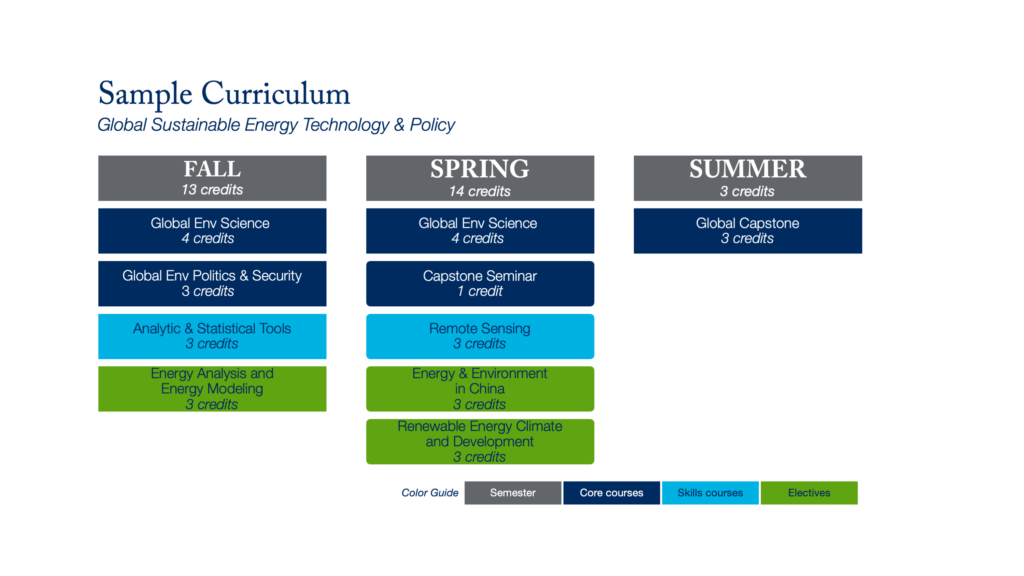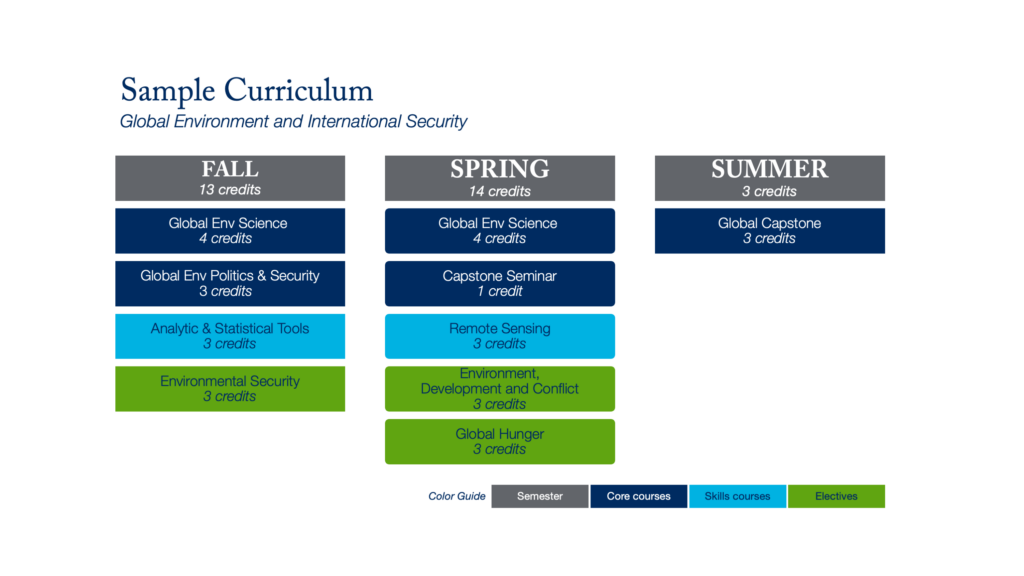Curriculum
The complexity of global environmental challenges requires decision makers with both international affairs and environmental sciences training. Explore the degree’s unique coursework offered on Georgetown’s historic Washington, DC campus, as well as the in-demand degree concentrations to prepare you for a future of interdisciplinary collaboration and changemaking.
Concentrations
Students in this program have the opportunity to go beyond the core curriculum and develop expertise in a specific area related to environmental and energy challenges by choosing one of three concentrations. These concentrations cater to students’ academic interests and career goals, preparing them for specialized roles in various employment sectors. To fulfill the requirements, students must take at least one science or technology elective and at least one politics or policy elective. Alternatively, they have the option to develop a personalized concentration in consultation with the program director.
1. Global Sustainable Energy Technology & Policy
This concentration provides students with the knowledge base and tools to identify the implications of energy policy choices and to pathways to a sustainable energy future. Pictured: sample curriculum.
Explore electives2. Global Environmental Science and Policy
This concentration provides students with a background in the environmental sciences including atmospheric and oceans science and the implications for global environmental change.
Explore electives3. Environmental Science and International Security
This concentration provides students with an understanding of food, energy and water insecurity and their impact on the global landscape.
Explore electivesCoursework
Within each concentration, at least 1 elective must be a science or technology course, and at least 1 must be a politics or policy course.
Core and skills courses
Students must take all core courses listed below and at least 6 credits of skills courses. Examples of skills courses are listed below.
| Course Type | Name | Credits |
|---|---|---|
| Core | Science of Global Environmental Challenges I | 4 |
| Core | Science of Global Environmental Challenges II | 4 |
| Core | Global Environmental Politics and Security | 3 |
| Core | Capstone Seminar | 1 |
| Core | Global Capstone Course | 3 |
| Skills | Geographic Information Systems | 1.5 |
| Skills | Remote Sensing | 1.5 |
| Skills | Quantitative Methods | 3 |
| Skills | Qualitative Field Research | 1.5 |
| Skills | Data Science and Analytics | 3 |
| Skills | Python for Policymakers | 1 |
| Skills | Climate Modeling | 3 |
| Skills | International Negotiations | 3 |
Representative Electives by Concentration
*Pending availability
| Course Name | Concentration | Credits |
|---|---|---|
| Global Energy Transitions and Models | Global Sustainable Energy Technology & Policy | 3 |
| Deep Decarbonization | Global Sustainable Energy Technology & Policy | 3 |
| Clean Energy Innovation | Global Sustainable Energy Technology & Policy | 3 |
| Energy and Environment in Eurasia | Global Sustainable Energy Technology & Policy | 3 |
| Energy & Environment in China | Global Sustainable Energy Technology & Policy | 3 |
| Renewable Energy Climate and Development | Global Sustainable Energy Technology & Policy | 3 |
| Clean Energy Investment Development Economics | Global Sustainable Energy Technology & Policy | 3 |
| The Energy Transition | Global Sustainable Energy Technology & Policy | 3 |
| Sustainability, Innovation, and Tech | Global Sustainable Energy Technology & Policy | 3 |
| Energy: Players, Markets, Projects | Global Sustainable Energy Technology & Policy | 3 |
| Caspian Energy: Theory & Practice | Global Sustainable Energy Technology & Policy | 3 |
| Deep Decarbonization | Global Environmental Science and Policy | 3 |
| The Ocean and Global Change | Global Environmental Science and Policy | 3 |
| Global Environmental Negotiations | Global Environmental Science and Policy | 3 |
| Environmental Change in the Arctic | Global Environmental Science and Policy | 3 |
| Environmental Economics | Global Environmental Science and Policy | 3 |
| Environmental Policy | Global Environmental Science and Policy | 3 |
| Science and Policy Development in Latin America | Global Environmental Science and Policy | 3 |
| Sea Level Change & Coastal Adaptation | Global Environmental Science and Policy | 3 |
| Physics and Chemistry of Earth’s Climate | Global Environmental Science and Policy | 3 |
| Energy and Environment in Eurasia | Global Environmental Science and Policy | 3 |
| Policies for Clean Air and Global Health | Global Environmental Science and Policy | 3 |
| Infrastructure and the Environment | Global Environmental Science and Policy | 3 |
| National Climate Solutions: Tackling Challenges | Global Environmental Science and Policy | 1.5 |
| Agricultural Food Systems and Econ Development | Global Environmental Science and Policy | 3 |
| Climate and Development | Global Environmental Science and Policy | 3 |
| Climate Change Resilience | Global Environmental Science and Policy | 1.5 |
| International Climate Policy and Diplomacy | Global Environmental Science and Policy | 3 |
| Navigating a Climate of Change | Global Environmental Science and Policy | 3 |
| Caspian Energy: Theory & Practice | Global Environmental Science and Policy | 3 |
| Gender & Environment: Latin America | Global Environmental Science and Policy | 3 |
| Environmental Policy in Europe | Global Environmental Science and Policy | 3 |
| Global Justice/The Environment | Global Environmental Science and Policy | 3 |
| Global Environmental & Climate History | Global Environmental Science and Policy | 3 |
| Global Hunger | Environmental Science and International Security | 3 |
| Agri-Food Systems and Economic Development | Environmental Science and International Security | 3 |
| Environment, Development and Conflict | Environmental Science and International Security | 1.5 |
| Food System, Transformation and Global Development | Environmental Science and International Security | 1.5 |
| The Energy Transition | Environmental Science and International Security | 3 |
| Transnational Security | Environmental Science and International Security | 3 |
| Energy: Players, Markets, Projects | Environmental Science and International Security | 3 |
| Environmental Security | Environmental Science and International Security | 3 |
| Russia/Europe Relations: Climate/Energy/War | Environmental Science and International Security | 3 |
| Water in MENA: Local Practices and Politics | Environmental Science and International Security | 3 |
| Water, Conflict and Peace | Environmental Science and International Security | 3 |
| Critical, Human and Environmental Security | Environmental Science and International Security | 3 |
| Sea Level Changes & Coastal Adaptation | Environmental Science and International Security | 3 |
| Physics and Chemistry of Earth’s Climate | Environmental Science and International Security | 3 |
Apply Now.
Secure a meaningful career with a positive impact on people and the planet through this flexible yet rigorous interdisciplinary degree from Georgetown University.






